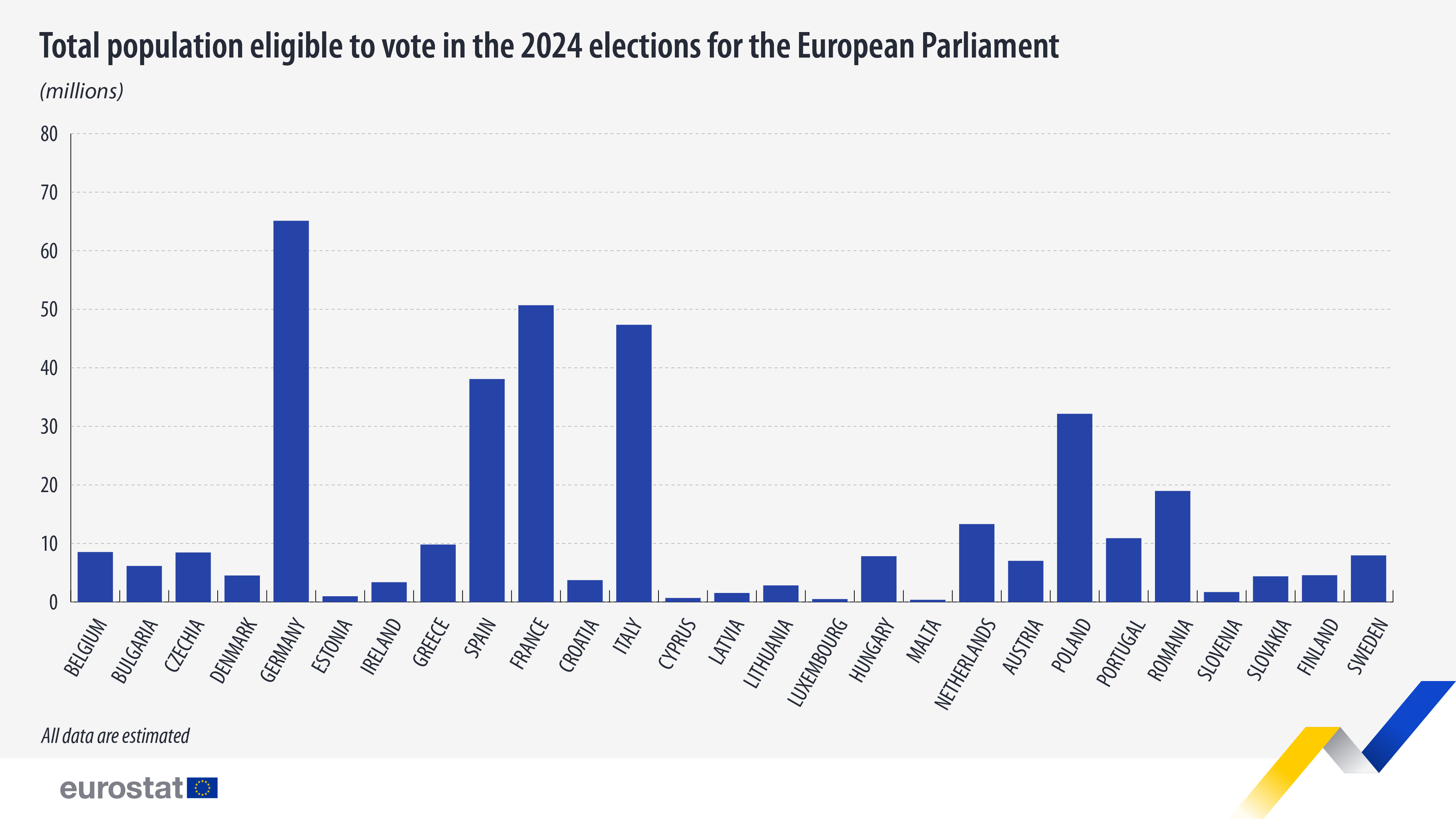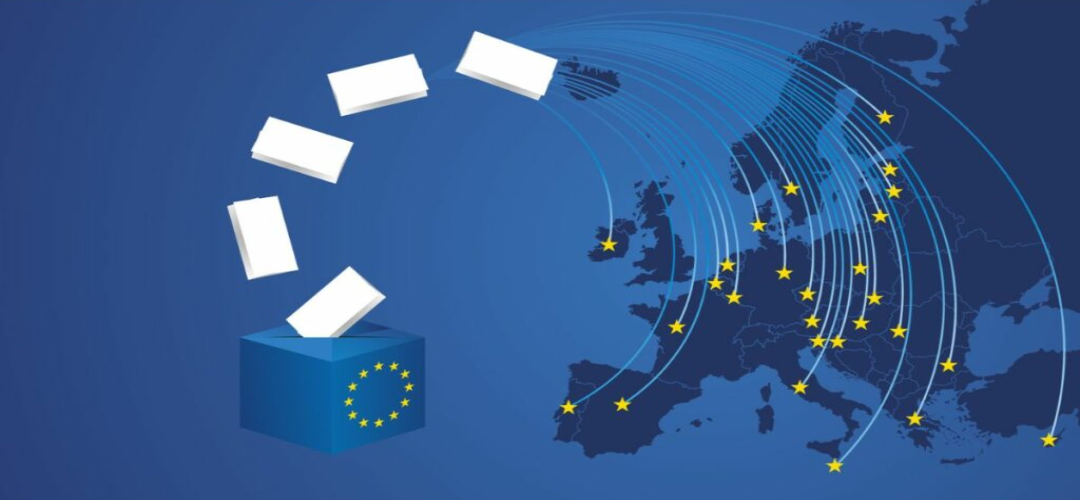What’s at stake, and global implications?
The European Union (EU) is gearing up for a crucial set of elections in June 2024. These elections, held every five years, will significantly shape the European Union’s (EU) political landscape and have far-reaching implications for global politics, economics, and ongoing conflicts.
Background
On 22 September 2023, following Parliament’s legislative resolution of 15 June 2023 on the composition of the European Parliament, the European Council adopted a decision establishing the composition of Parliament, increasing the total number of seats in Parliament from 705 to 720. Therefore, the number of MEPs will increase after this June’s elections. Parliament asserts its institutional role in European policy-making by exercising its various functions. Parliament’s participation in the legislative process, its budgetary and control powers, its involvement in treaty revision and its right to intervene before the Court of Justice of the European Union enable it to uphold democratic principles at the European level.
The elections will determine the composition of the European Parliament, one of the EU’s three main institutions, and will impact the EU’s policies and actions on various fronts, including climate change, security, and economic cooperation. As the EU’s legislative branch, the European Parliament plays a crucial role in shaping EU policies, passing laws, and overseeing other EU institutions. The Parliament represents a diverse range of political ideologies and national interests. The upcoming elections will determine the composition of this body and, consequently, the direction of EU policies for the next five years.

Analysis
The upcoming elections are anticipated to reflect a significant shift to the right, with right-wing parties gaining substantial ground across Europe. This trend is evident in recent electoral victories and the growing influence of right-wing parties in national politics. The European Conservatives and Reformists (ECR) and the Identity and Democracy (ID) parties are poised to increase their seats significantly.
Over the past decade, a notable trend has been the rise of Euroscepticism and populism across Europe. Eurosceptic and populist parties advocate for national sovereignty over EU integration, stricter immigration controls, and economic protectionism. These parties have gained momentum and could see a significant presence in the European Parliament, challenging the traditional pro-EU stance. Their influence could lead to re-evaluating the EU’s approach to integration and policy-making, potentially reshaping the future of the European Union.
Simultaneously, there has been a surge in support for green parties, reflecting the growing importance of environmental issues among European voters, particularly the younger generation. Green parties focus on addressing climate change, promoting sustainability, and advocating for social justice. Their increasing traction suggests that environmental policies and funding for green initiatives could become more prominent in the EU’s agenda. The success of these parties in the elections could lead to stronger environmental policies and a greater emphasis on sustainability.
With the rapid advancement of technology, issues such as data privacy, cybersecurity, and the regulation of tech giants are at the forefront of political discourse. Parties that emphasize tech-savvy policies and digital rights will likely resonate with voters, shaping the future of digital governance in the EU.
Economic recovery and resilience remain paramount concerns in the post-pandemic era. Addressing economic disparities between EU member states, supporting small and medium-sized enterprises (SMEs), and implementing policies to boost innovation and competitiveness will be key electoral issues. As Europe emerges from the pandemic, the elections will play a crucial role in determining how the EU navigates its economic recovery and builds resilience against future crises.
The global implications of the upcoming European Parliament elections are profound, as the EU’s influence extends far beyond its borders. One key area of impact is trade and economic relations. As one of the world’s largest trading blocs, the EU’s policies significantly shape global trade dynamics. The election outcomes will influence EU trade agreements, tariffs, and economic partnerships. Should the elections lead to a more protectionist stance, trade tensions could arise, potentially disrupting global markets. Conversely, a liberal approach might foster stronger economic ties with global partners, promoting international trade and economic cooperation.
Another critical area is climate leadership. The EU has long been at the forefront of climate action, setting benchmarks that other countries often follow. The success of green parties in the elections could reinforce the EU’s commitment to the Paris Agreement and inspire other nations to adopt similar measures. However, a shift away from green policies could weaken these initiatives, reducing the momentum of international climate action and potentially hindering progress towards global environmental goals.
The EU’s role in setting technological standards and data privacy norms also has significant global repercussions. The General Data Protection Regulation (GDPR) has established a global standard for data privacy, influencing how companies worldwide handle personal data. Future digital policies will shape international norms around technology regulation, cybersecurity, and artificial intelligence. The EU’s stance on tech governance will affect global tech companies and international collaborations, making the election results pivotal in determining the future landscape of digital rights and regulations.
Human rights and democracy are core values that the EU has traditionally championed on the global stage. The election outcomes will determine how the EU continues to promote these values, particularly in its interactions with authoritarian regimes and in addressing human rights abuses.
Immigration policy is another area likely to be significantly influenced by the elections. A shift to the right in the EU is expected to result in a more security-centric approach to immigration. This could lead to stricter border controls, more restrictive asylum policies, and increased cooperation with third countries to manage migration flows. Such policies might reduce the number of immigrants entering the EU, potentially impacting the EU’s demographic trends and economic growth. Additionally, the shift might lead to a decreased emphasis on migrant integration, reducing support for programs aimed at promoting social inclusion and cultural adaptation of immigrants.
Further, right-wing parties often advocate for protectionist tendencies, which could lead to increased tariffs and trade barriers. This might harm the EU’s trade relationships with other countries, potentially sparking trade wars. However, these parties also prioritize economic interests, which could result in a more pragmatic approach to trade policy, focusing on economic gains rather than broader social and human rights concerns. This shift could have significant implications for the global trading system, influencing economic interactions and international relations.
In the Middle East and North Africa (MENA) region, the election outcomes will influence the EU’s migration, security, and development aid policies. A Parliament with a strong right-wing presence might push for stricter immigration controls and reduced involvement in the region. In contrast, a left-leaning majority could advocate for more humanitarian assistance and diplomatic engagement, fostering stability and development. The elections will determine the extent of investment in African development projects, trade agreements, and efforts to combat terrorism and instability.
In the Russia-Ukraine conflict, the election results will shape the EU’s stance on sanctions against Russia, military support for Ukraine, and humanitarian aid. A strong pro-EU majority could ensure continued robust support for Ukraine. In contrast, a rise in Euroscepticism might result in a more cautious approach, potentially weakening the EU’s resolve against Russian aggression.
The EU’s relationship with China and its strategy in the Indo-Pacific region are also crucial for global geopolitics. The election results will shape the EU’s approach to China’s human rights record, trade practices, and regional influence. A more assertive stance could align the EU with the U.S. and other allies, enhancing collective pressure on China. Conversely, a conciliatory approach might prioritize balancing economic interests with strategic concerns, aiming for a more cooperative relationship.
Assessment
- The 2024 EU elections are a critical juncture for Europe and the world. The emerging trends suggest a potential reshaping of the political landscape, with significant implications for global trade, climate action, digital governance, and human rights.
- The outcomes will not only determine the EU’s internal policies but also its role on the global stage, influencing international relations and ongoing conflicts.
- As voters head to the polls, their choices will resonate far beyond Europe’s borders, underscoring the interconnectedness of our modern world. The future of the EU and its impact on global affairs hinges on the decisions made in these pivotal elections.




